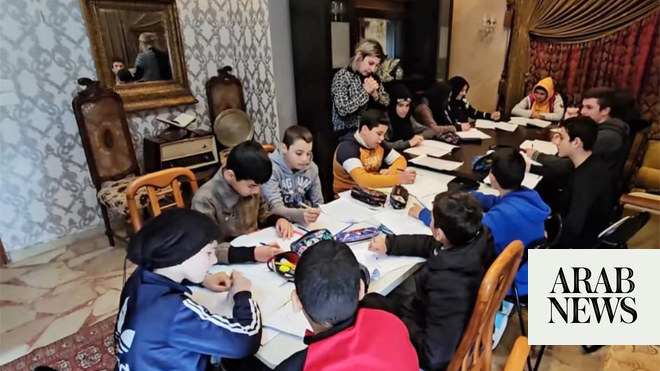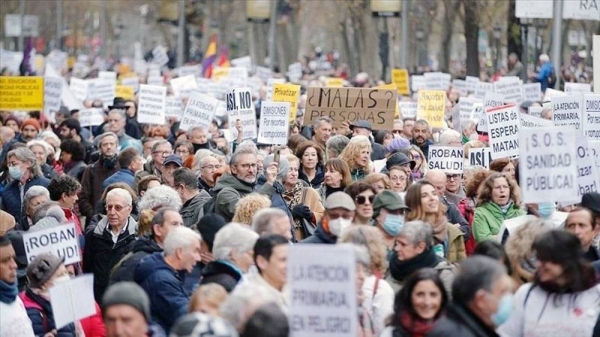
Tens of thousands of Syrians will no longer receive legal support, leaving many “in utter destitution” without documents they need to work, travel or return home, after the British government pulled £4m in funding from a charity programme, according to its director.
News of the cut to a Norwegian Refugee Council (NRC) project supporting refugees and internally displaced Syrians, comes amid reports of a planned 67% aid reduction in the Foreign, Commonwealth and Development Office (FCDO) budget for Syria, which would place hundreds of thousands of lives at risk.
A decade of conflict has left more than 90% of Syrians in poverty, 12.4 million facing food insecurity and 12.2 million without access to clean water.
Jan Egeland, the secretary general of the NRC, said: “This cut means we need to stop legal and protection assistance for 65,000 displaced people in Syria and Lebanon. Syrian children will no longer get help to get birth certificates, students and schoolchildren will no longer get help to get exam or training documents and we can no longer help people with housing, land and property rights.”
It could also lead to people having to stay longer in camps, he said.
“For some people, who hoped to be integrated into Lebanon, that hope has gone,” Egeland said. “It’s utter destitution when you are paperless.”
The cuts runs counter to the UK’s ideals and interests, he said.
“The UK has been a champion of legal advice for refugees for many years, so that people can one day return to working life as productive citizens.”
Bahia Zrikem, of NRC, said staff had reported increased child labour, and families reduced to eating two meals a day.
“Humanitarian needs are increasing, not falling” she said.
Preet Gill, the UK shadow international development secretary, said: “Slashing life-saving support to a country where more than 90% of the population have been plunged into poverty after a decade of death and destruction is disgraceful. This callous move highlights a blatant disregard by this government to fulfil its moral duty.”
Cuts to aid, from a legally protected level of 0.7% of GDP to 0.5%, were announced in November by the government, which has been accused by aid groups and parliamentarians of poor transparency over where and when the cuts will fall.
Ahead of a donor conference for Syria on Monday, the UN’s office for humanitarian affairs urged donors including Britain, Syria’s third largest donor, to continue to support the country. “As we approach the Brussels conference, we are calling on all donors to continue to stand by those who rely on our support after 10 years of conflict,” said a spokesperson.
Laurie Lee, of Care International, said the organisation had already seen its work in Syria cut by 36% in the past year. “Though budgets are not yet confirmed, if there are further cuts, important work which has been funded by people in the UK will be in jeopardy, including resilience building efforts, which help Syrians rebuild their lives following 10 years of conflict.”
The NRC and Care are unusual in disclosing FCDO cuts already made to budgets. Other NGOs say they have been left in financial limbo, knowing cuts are planned but not where they will be made.
Some claim the government is “gagging” development charities from talking publicly about the impact of the aid budget cuts on their programmes.
One executive of a development charity, who asked for anonymity to safeguard their relationship with the FCDO, said: “It’s no exaggeration to say there is an atmosphere of fear in the aid sector at the moment. The cuts are going to cost thousands of lives and yet we are being pressured by some quarters of the FCDO to not discuss them publicly as it could compromise ongoing funding decisions.”
“You can dress it up in legalese, but it feels as though the sector is being silenced in order that these cuts can be forced through with little or no scrutiny. The public have a right to know about the damage this decision will do, and the thousands of lives they will cost.”
Stephanie Draper, chief executive of Bond, the NGO network, described reports that people were being warned against speaking out as “very concerning”. “Policymakers and the public need to understand the serious implications of this political decision,” she said.
A government source said civil servants had also been kept in the dark.
“There is a sense of a very tight circle around Dominic Raab, with special advisers and policy advisers,” they said. “The flow of information to staff was better under DfID [Department for International Development – since merged with the Foreign Office].”
“Partners are very frustrated, people can’t plan. But there is not a huge amount of sympathy for NGOs complaining about that.”
A UK government spokesperson said: “We have been delivering life-saving aid and support direct to the Syrian people – including over 28m food rations, over 20m medical consultations and over 14m vaccines – since 2012.
“The seismic impact of the pandemic on the UK economy has forced us to take tough but necessary decisions, including temporarily reducing the overall amount we spend on aid.”
“We are still working through what this means for individual programmes and decisions have not yet been made.”










